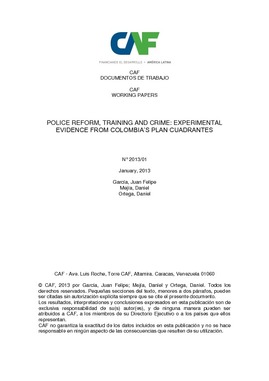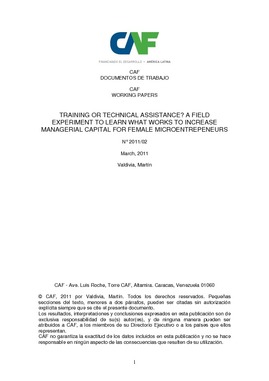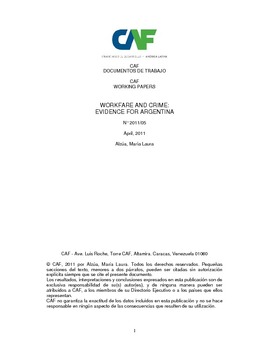Police reform, training and crime: experimental evidence from colombia's plan cuadrantes
Resumen
The Plan Nacional de Vigilancia Comunitaria por Cuadrantes (PNVCC) is a new police patrolling program introduced in the eight major cities of Colombia in 2010 by the National Police. The strategy divides the largest cities into small geographical areas (cuadrantes), assigns six policemen to each, establishes a new patrolling protocol involving more community contact, and holds officers accountable for crime in their assigned area. The plan warranted a comprehensive training program for over 9,000 police officers aimed at improving interpersonal skills and implementation of the new patrolling protocols. By staggering the training schedule between three randomly chosen cohorts of police stations, we generate experimental variation in the exposure to training and in the effective implementation of the new police protocols induced by the Plan Cuadrantes. Comparing the 4 months immediately after training with the same months from the previous year, we find a significant reduction in several types of crime attributable to the training program, ranging from around .13 of a standard deviation for homicides to .18 of a standard deviation for brawls. These impacts are driven by very large effects in high crime areas and very small -or zero- effects in low crime neighborhoods. Once we take into account the high spatial concentration of crime, the estimated effects account for an overall reduction in the number of homicides of about 22%. We suggest that the training program affected crime by increasing the patrol police’s sense of accountability to the population and also possibly through higher police motivation. Large efficiency gains in public service provision may be attainable with relatively inexpensive interventions that bring public servants closer to their clients.
Materia
País / Región
Fecha
2013Citar de esta publicación
Item perteneciente a la Colección
Items Relacionados
Training or technical assistance? A field experiment to learn what works to increase managerial capital for female microentrepeneurs
This study evaluates the impacts of a business training program serving female microentrepreneurs in Lima that have previously benefited with the titling ...
Workfare and crime: evidence for Argentina
This paper investigates the effect of introducing a massive workfare program on property crimes. In order to circumvent the endogeneity problem common ...
Job training, selection and self discovery
We randomly assign 1250 unemployed men and women to be invited once or twice to a specific-skills training program offered by a large multinational firm ...






